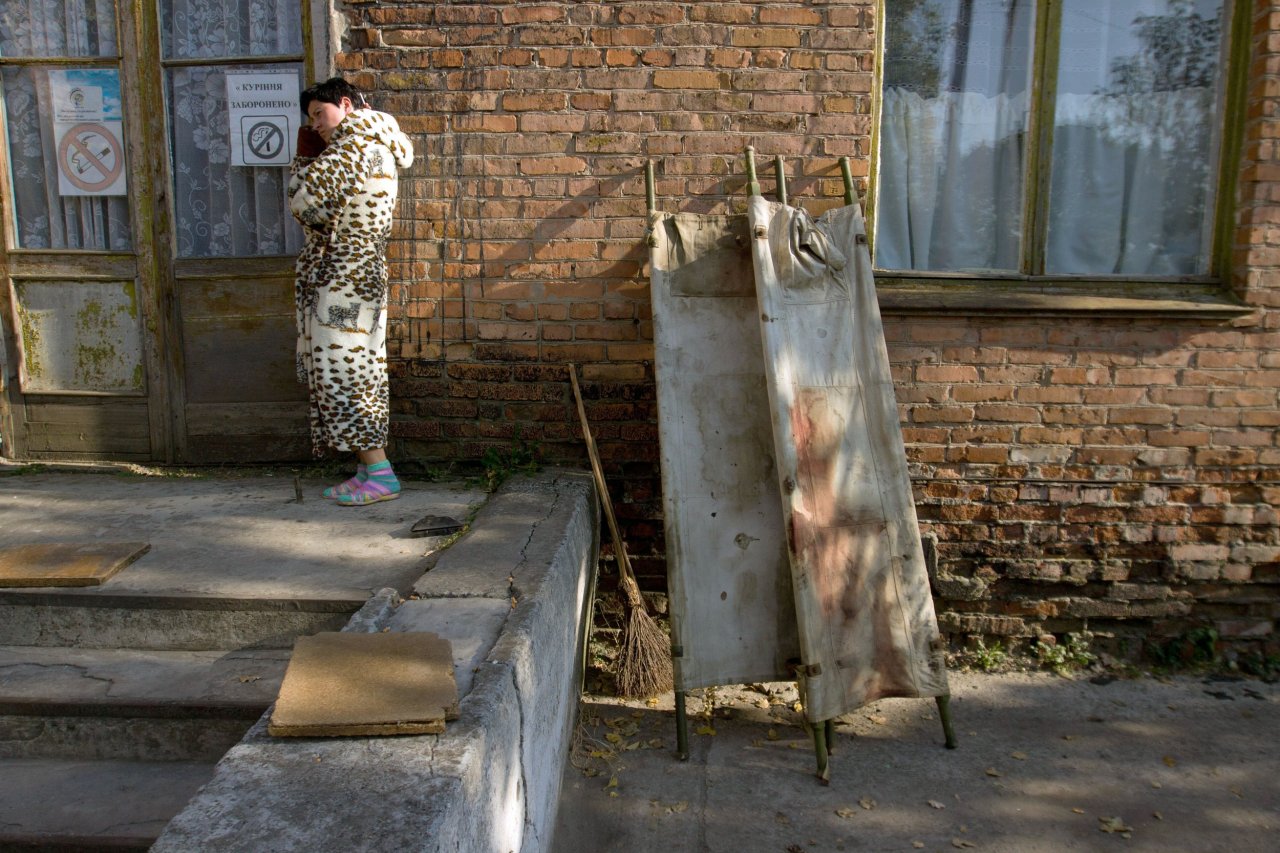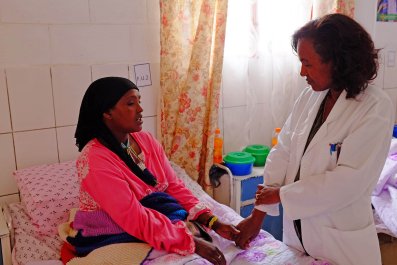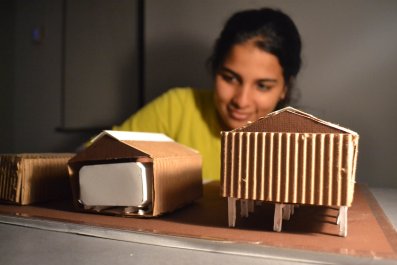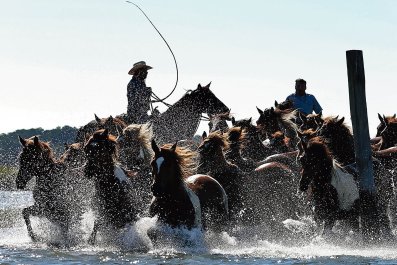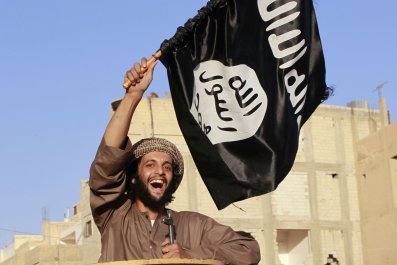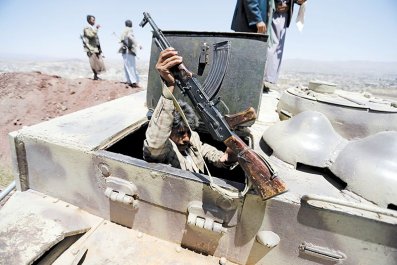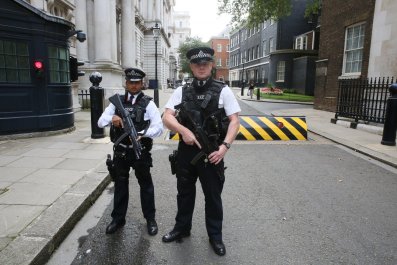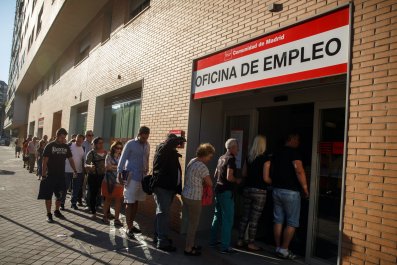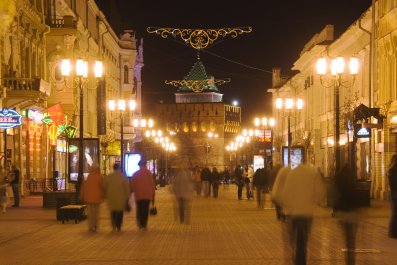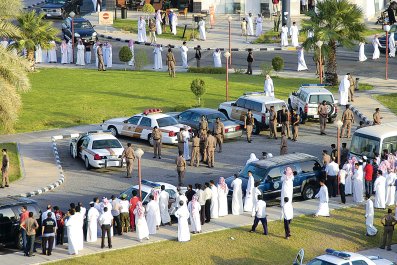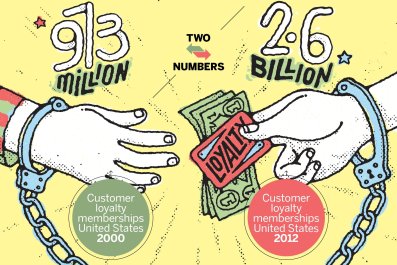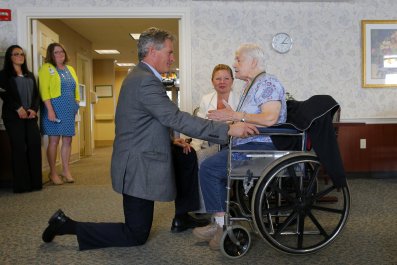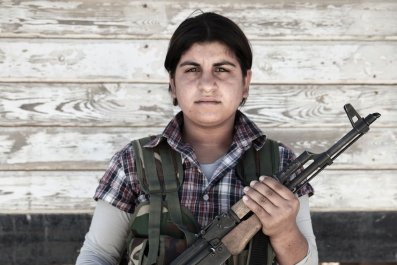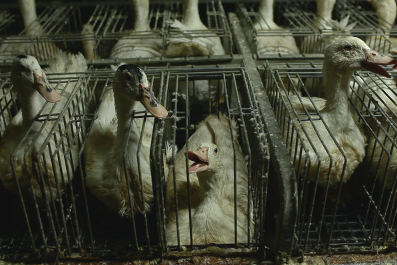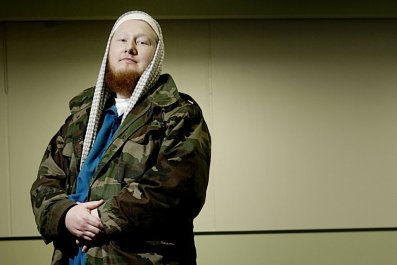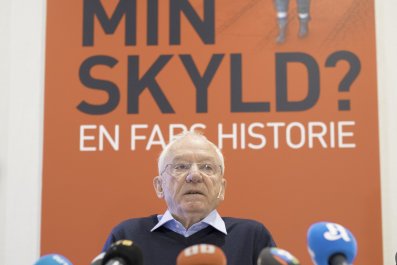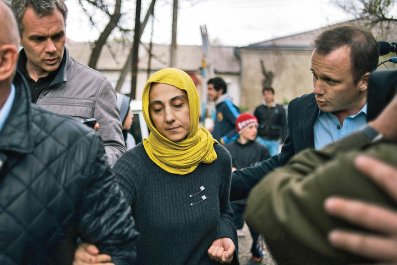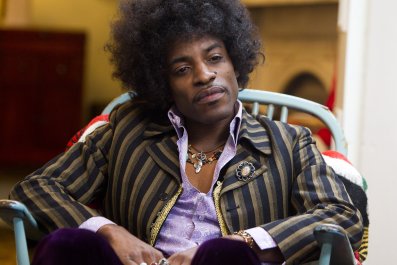A road sign marks the turning into the village of Pobeda, in Ukrainian-controlled North Luhansk. The sign is missing the first two letters, turning pobeda (victory) into beda (woe). It's an appropriate enough symbol for the reversal of Ukrainian military ambitions in the area. Up until the night of September 2nd, the village served as the base for the northern command of Ukraine's "anti-terror" operation. All that changed when the camp was razed to the ground by a high-precision Smerch rocket attack, believed to have come from territories near or beyond the Russian border.
Today, the landscape in Pobeda is apocalyptic: empty, scorched fields, interrupted only by the scattered remains of munitions, abandoned artillery positions, tyres and missile shells. Tanks, armoured personnel carriers and transport lorries have been reduced to oxidised carcasses and white ash. Plastic bottles and blackened military instructions scuttle with the wind along the naked black soil.
Galina Akhmedova, 59, casts a lone figure among the rubble. She is searching for something – food, she says. Given what is left of the camp, scrap metal seems more likely. Akhmedova is a poor woman even by local standards. None of her family has regular work, so her 500 hyrivna monthly pension (€30) has to go a very long way. Three generations and five grandchildren are to some extent dependent on it.
Ukraine's unexpected war has not made life easy for Akhmedova. Last month's rocket attack blew away some of her windows and torched part of her roof; she still doesn't know where she might be able to find money to repair them. A week before, soldiers took away her 23-year-old son, Sergey, after accusing him of assisting the separatists (she insists unfairly). Sergey's body was black and blue when he returned home, and his right eye still twitches from the nerve damage.
It comes as somewhat of a surprise, therefore, to hear how defensive Akhmedova is of the Ukrainian military presence. The majority of the soldiers are good boys, she says. She'd been particularly fond of the ones from western Ukraine, "What with their how-do-you-dos and good evenings – no one says that around here. The only thing to remember was to say the right thing when they walked past. They would say Slava Ukrayini! (glory to Ukraine). "And you have to say, what is it now? Slava . . . Ukrayini slava."
"No Galya, Heroyam slava (glory to the heroes), you're meant to say Heroyam slava." The woman correcting Akhmedova is her neighbour Nina Kalipa, who is also the librarian in Pobeda.
"Oh, yes, that's right. Heroyam slava. They like it when you say that."
It is unclear whether Akhmedova's support of the Ukrainian soldiers is entirely genuine or an understandable calculation. In the land of the "ceasefire" – currently holding only where military control isn't in the balance, and perhaps not for long even there – ordinary citizens are hedging their futures between east and west. On the one hand, locals are careful to say the right things to the military, and do not make overt pro-Russian or pro-separatist statements. On another, it is hard not to notice the sharp reduction in the number of Ukrainian flags flying in the border regions of Luhansk; just a month ago, blue and yellow were flying everywhere.
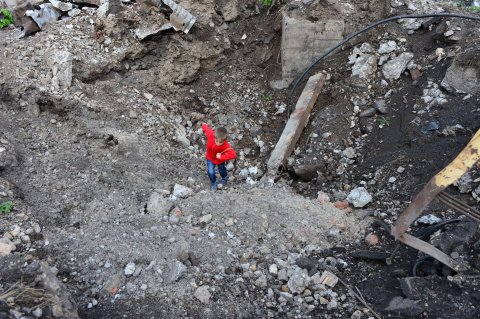
The situation today is somewhat reminiscent of a scene from the Soviet comedy film Wedding in Malinovka, which was set in a Ukrainian village during the time of the Russian Civil War. With power alternating almost daily between red and Ukrainian nationalist forces, the villagers of Malinovka are never sure who is in charge, so they modify their behaviour and dress accordingly. The movie's catchphrase is "the authorities are changing again", and the characters' habit of either donning or removing a budenovka partisan hat, could well be applied to any of the towns on the frontlines today.
Rubezh, a commander in Aidar volunteer battalion, a controversial anarchic pro-Ukrainian military formation based nearby in Starobilsk, says it is only a matter of time before all of the flags disappeared: "The current boundaries don't suit the other side, and they are waiting the other side of the Donets river, just waiting to take their chance and claim the entire Luhansk region. I think it would suit many of the locals if they did, no doubt. Not a majority, but if it came down to guerrilla warfare, the split might not be far off 50-50". Everyone in Starobilsk is waiting for the Russians to arrive, he adds. "They all want their rouble pensions."
Starobilsk pensioners are not doing so badly when compared to others in the region. In the battle-scarred town of Schastya (Happiness), pensioners have not received a kopeck since June, and have been forced to survive on their savings and ad-hoc handouts from a group of soldiers from Aidar batallion. The formal rationale for the mess is that as a satellite of war-savaged Luhansk – on the other side of the frontline – Schastya cannot administer social payments on its own. In other words, Kiev authorities must first transfer the register to another administrative centre. Despite the many promises, Kiev has thus far dragged its heels; a humanitarian catastrophe beckons.
"No wage or pension has been paid for over three months, and the population is on the edge of a hunger riot," said Oleksandr Boginya, Schastya's newly-appointed interim mayor. The previous mayor resigned, so hopeless was the predicament in Happiness.
Isolated from the rest of Ukraine, the sense of abandonment has been compounded by the levels of distrust between the civilian population and Ukrainian forces. Understandable fear prevails on both sides. Locals talk of their unease at drunk soldiers walking around town with guns. Ukrainian volunteer fighters complain about locals acting as spotters for pro-Russian forces. "We hear the chatter over the radio frequencies, and it's often women doing the talking," says Slava, a commander of the 12th volunteer battalion from Kiev. "They'd be saying 50 metres to the right, 50 metres to the left." For all the efforts to maintain good relations, it was difficult to fully trust the local civilian population, he says – "especially when lives were being lost".
The soldiers feel the rest of the country has forgotten about them. Ever since arriving on the frontline regions of Luhansk, they have had no one to rely upon but themselves and a busy cohort of activists who provide them with basic essentials, body armour and other military aids. They are naturally distrustful of the ceasefire agreement. But the apparent acceptance of all of the Russian gains, and the creation of new de-facto separatist state south of the Donetsk river, raised many questions for them: what was the meaning of the last four months? For what did their comrades die? Why were they abandoning part of Ukraine to fate and a "criminal mob"? Some seemed despondent, some expressed a desire to return home.
As one of the medics of Aidar battalion, the ironically-titled "Hannibal Lecter", put it: "Many of our soldiers have died many times. They've lost it: they don't live in your world, or my world, or Kiev's world. They aren't foolish enough to believe the ceasefire talk. They just want to finish the job, and they will do it regardless."
Ukraine, Russia and the world would be foolish to ignore the dangers posed by this group of fighters. The "ceasefire" and peace agenda appear in large part a personal project of the Ukrainian president, Petro Poroshenko, and under considerable pressure from the West.
Poroshenko goes against government colleagues, most notably in the Interior Ministry, and much of the population in taking this route. It is a gamble that depends on the acceptance of the ceasefire by Russia and Russian-backed forces. With mounting casualties, especially in Donetsk and surrounding towns, the evidence thus far is not convincing.
Should the ceasefire fail even more spectacularly, should Russian-backed forces make further advances across Luhansk or towards Crimea in the South, Poroshenko's position will surely come under question. Given Russia's military superiority, the question ultimately boils down to a simple conundrum: whether Russia wants to support this particular Ukrainian president, and whether this president can extract such support without being branded a traitor and triggering Maidan 3.0. It seems an impossible tightrope, and is why today's "ceasefire" looks like being far from the end of the story.



